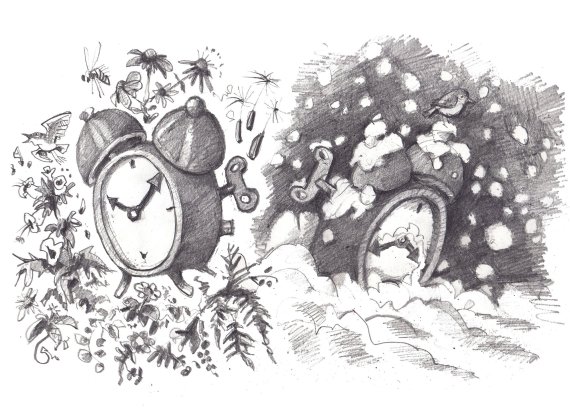The clocks will go back on the night of 26 to 27 October as we switch to winter time. But as far as the European Union is concerned, there will be no more changing the clocks as of April 2021. Each member state will then have to introduce permanent winter time or summer time. What problem is that actually solving? And which time should we choose?

Vera Putker
MSc student of Plant Sciences
‘I’m totally in favour of keeping the switch between summer time and winter time. That means it is still a bit light on winter mornings and we can enjoy really long evenings in the summer. I like going outdoors on walks or cycling, and I do that a lot less in the winter just because it gets dark early. That makes it so nice in the summer to be out at that time of day. I don’t understand the argument that changing the clocks is bad for our natural biorhythms. Your natural biorhythm is to get up as soon as it’s light and go to bed as soon as it’s dark. Nobody lives according to that principle any more in modern society.’

Joes ten Thij
BSc student of Plant Sciences
‘I’m in favour of permanent winter time. That’s the logical option if you want to take our neighbouring countries into consideration. Permanent summer time wouldn’t be good for our biological clocks. I certainly find the changes a problem. I can tell my biological clock is confused after the clocks have changed. It takes me a week to adjust. In particular for people who don’t find it easy to “switch”, it’s important to choose one permanent time.’
It always takes me a week to adjust when the clocks change

Francesco Secchi
Postdoc in Development Economics
‘Sometimes, in June, I sit next to the Rhine feeling the last rays of sun on my face. It’s already late and I often think what a wonderfully long and rich day it has been! The proposed ending of summer time will mean I won’t experience that again, I guess. That would be a pity. I would prefer to keep summer time as our standard time, but it would be best to choose the same time for all of Europe. If the EU countries have different time zones, that would feel like a step back from an ever-closer union, something our European generation would never want.’

Ruben Dümmer
MSc student of Plant Sciences
‘As far as I’m concerned, it should stay as it is as opinions are very divided at present. Of course it’s great during summer time to be outside in the light until 11 in the evening and take one last dip in the Rhine. In the autumn and spring you can go for a walk up to eight o’clock and enjoy the light. I do find going to bed early more difficult in summer time as it’s light until late and that doesn’t feel natural. Research has shown that it is better for our biological clocks to have permanent winter time. It might be dark one hour earlier but of course you can get up one hour earlier and get just as much out of the day as you normally would.’

Patrick Jansen
Associate professor in the Resource Ecology group
‘Personally, I don’t find the clocks changing a problem but it is a problem for my work. I use camera traps to study the activity patterns of wild animals. The time changes are really annoying for this. We have to put the cameras all on the same time regime but mistakes are often made when setting the camera times. That reduces the data quality. I have heard that permanent winter time is slightly more in line with the human biorhythm than permanent summer time. For me, it would mean waking up extremely early in the summer as I tend to wake up when the sun rises. Fortunately I don’t live in northern Sweden!’

Robert Martinez Varderi
MSc student of Urban Environmental Management
‘I always hate it when they put the clocks back in the autumn as that makes the days much shorter. I don’t mind what time it gets light in the morning because I’m usually still sleeping then anyway. But I find it depressing if it’s dark when I come home from lectures. So I would prefer to keep to summer time. In other respects I don’t have much of a problem with it. My phone changes the time automatically so I don’t get confused. And it always happens in the weekend. Mostly I’m drinking beer then so I don’t really notice the difference the next day.
It would probably be nicer for cows to have permanent summer time

Martin de Bree
Manager at Dairy Campus
‘I think a lot of people have more difficulty switching between summer time and winter time than animals do. I work with cows that have to be milked every 12 hours. When the clocks change, we adjust the milking time gradually. If you suddenly turn up for milking one hour later, the cows will be fit to burst and you can’t do that to them. So we compensate by starting earlier on the first day of winter time. It would probably be nicer for the cows to permanently have summer time as they would spend longer in the field and be able to graze more.’

 Illustration: Henk van Ruitenbeek
Illustration: Henk van Ruitenbeek